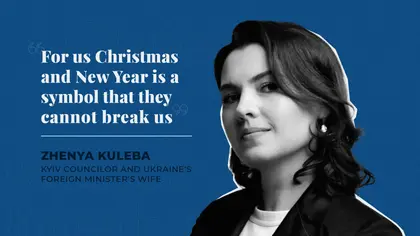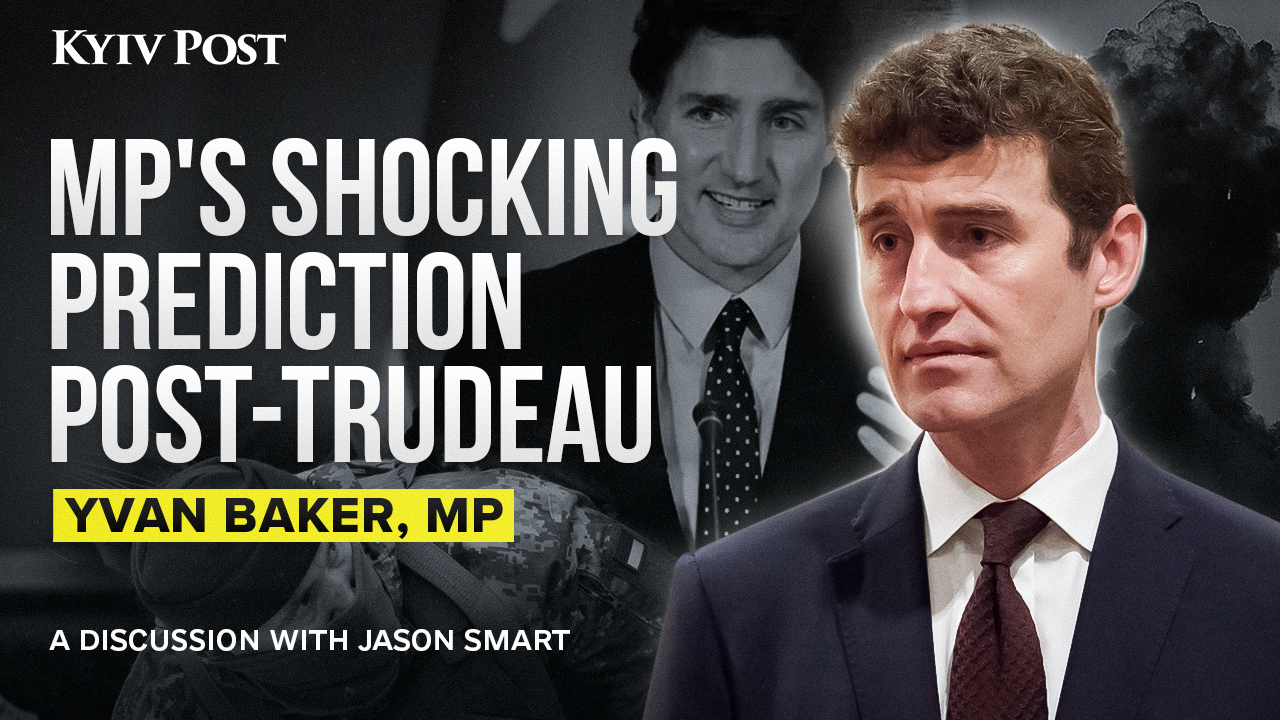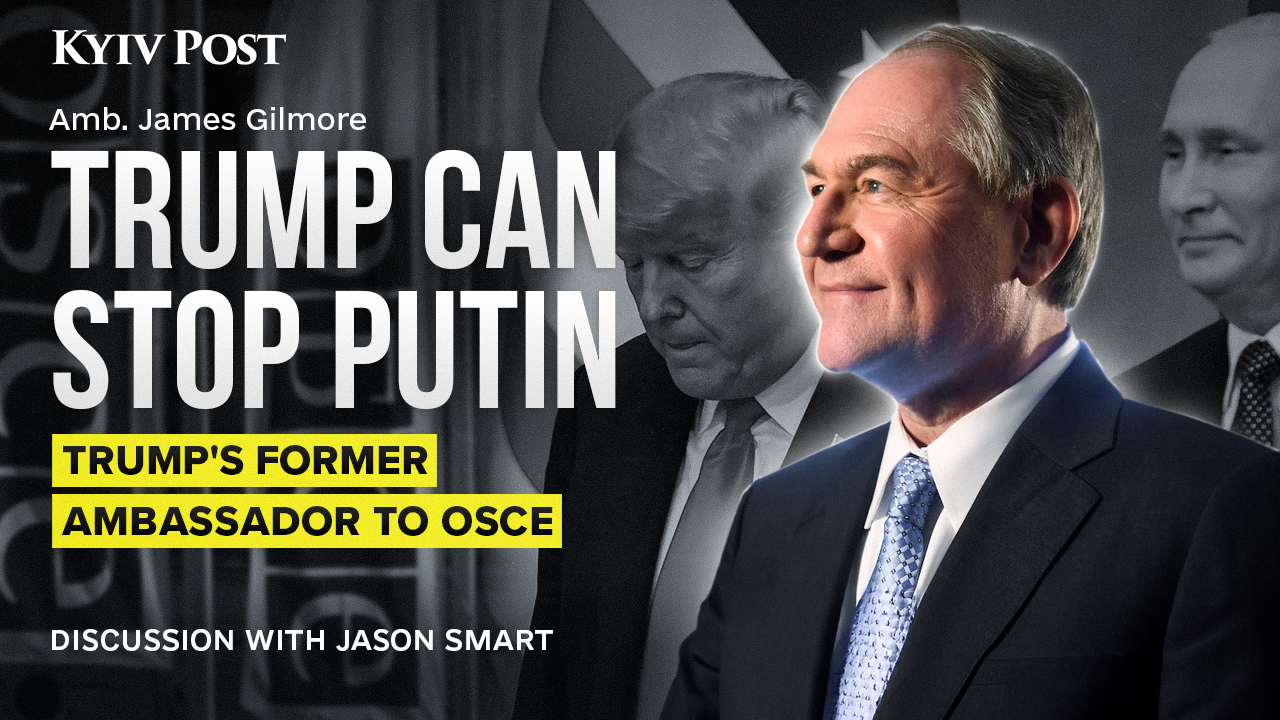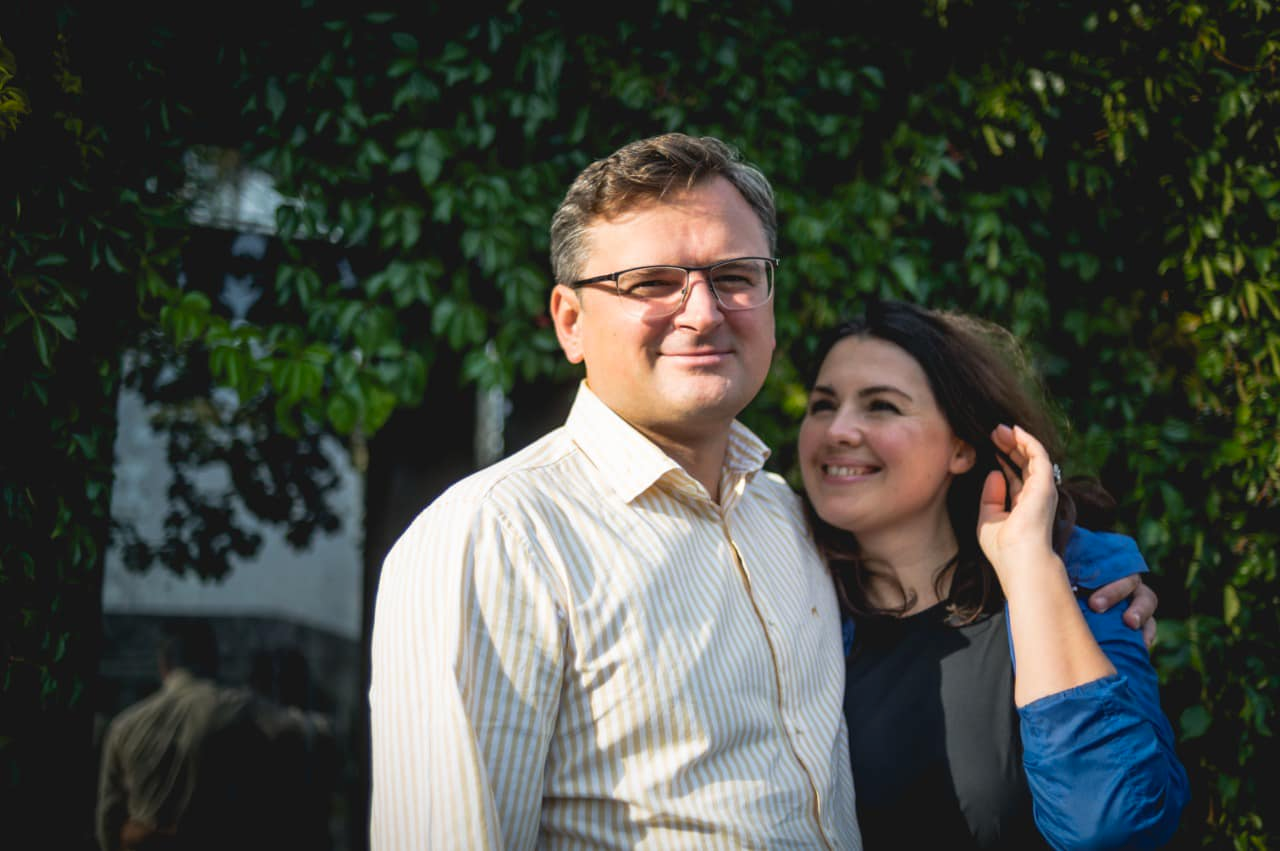Everybody knows the name of Dmytro Kuleba, the young and flamboyant Foreign Minister of Ukraine. In an exclusive interview, Kyiv Post talks to his wife, Zhenya.
Between her work as a Kyiv councilor and with a humanitarian foundation called Garden City, Zhenya Kuleba has been ranked by Focus magazine as the 44th most prominent woman in Ukraine. Like everyone in Ukraine, the full-scale war by Russia has had a huge impact on her family.
- See the latest war in ukraine update in the Kyiv Post’s news bulletins released today.
- Receive the latest Ukraine news bulletins for today.
JOIN US ON TELEGRAM
Follow our coverage of the war on the @Kyivpost_official.
For us Christmas and New Year is a symbol that they cannot break us
“We will celebrate Christmas and New Year at home this year,” says Zhenya Kuleba defiantly. “For us Christmas and New Year is a symbol that they cannot break us. Even if they are bombing, killing us, we still have a place for celebration, a place for family and a place for a peaceful life.”
Her kids, Yehor, 16, and Luba, 11, have no doubts about celebrating Christmas. Yevheniia, who prefers me to call her by her shortened name Zhenya, confesses that this year’s festive celebrations will not be like last year’s.
The Kyiv councilor for Shevchenkivsky District, who represents the Servant of the People party, believes there will not be huge celebrations at Sophia’s Square with a big Christmas tree and people drinking mulled wine as in past years.
We are trying to be closer to Europe and to switch our celebrations to December.
But Putin’s Russia will not be spoiling her party. Zhenya will be celebrating Christmas on Dec. 25 (according to the Gregorian calendar), and not on Jan. 7 (the Julian calendar), like most Ukrainians normally do. She outlines her reasoning. “We have to be connected to Europe, so even in this field of strong tradition, we are trying to be closer to Europe and to switch our celebrations to December.
With snow and ice already appearing on the streets of Kyiv, the 41-year-old councilor is making sure residents will be able to deal with the harsh winter conditions and anything else Putin throws at them, by establishing emergency shelters called “points of invincibility.” These are places where Kyivites can stay warm up, enjoy a hot drink, and recharge their mobile phones and laptops.
Zhenya says President Zelensky was justified in his recent spat with Kyiv Mayor Vitali Klitschko. “He started to prepare these emergency centers, but he was doing it so slowly, that when the missile attacks on Nov. 23 happened, we were not prepared.”
Members of the city council tried to visit the 400 centers and found many of them closed because they didn’t have generators.
She adds: “During that weekend members of the city council tried to visit the 400 centers and found many of them closed because they didn’t have generators. The funny thing is the war has been going on for nine months and we were not prepared. We should have predicted Russia would leave us without light and water.”
Family life and relationships can sometimes be difficult in normal conditions, but in wartime they can be amplified. On February 24, the day of the full-scale invasion, Zhenya was on vacation with her daughter Luba in Egypt, while her son Yehor was in Kyiv.
Being looked after by grandparents, she knew he was safe, but she got him out of the country and they were back in Kyiv by the beginning of May. As a councilor, Zhenya knew she was needed in Kyiv. But what made her feel proud was that her kids had decided to return and support her rather than stay on in Europe.
“The kids wanted to be with me and felt more connected to Ukraine than ever before. They felt more patriotic than prior the war,” she says.
Zhenya feels sorry for those whose education has been disrupted by the war. “They can’t attend school normally,” she says. “As soon as they get there the sirens go off. They go to the shelter and can’t have proper classes. For most kids they don’t go to school for knowledge, but to see friends and have conversations and try to get a normal life.”
Giving them a “normal life” is not easy and can be quite challenging.
“For the first time during the war my daughter asked me if she could invite her friends to stay overnight. It was scary because not only was I responsible for my own kids but other peoples’. I allowed it to happen and for them it was something really important because it felt like a part of peaceful life had returned.”
Now I am organizing a series of evacuation trips for the people from Slovyansk and other cities in the Donetsk region.
As well as looking after her family and Kyivites in her day job, Zhenya is also reaching out with humanitarian help to parts of eastern Ukraine with her NGO Garden City. “We used to do work in Luhansk and Donetsk oblast alone. I know people in these regions and we help them a lot.
“Now I am organizing a series of evacuation trips for the people from Slovyansk and other cities in the Donetsk region. We have partners in France, and they provide them with half a year place to stay, food and even a small amount of money to live on.”
Despite her straight-talking, another side of Zhenya is revealed when I ask her how she copes in this war situation. Is it something you can get used to? She tells me about a two-day-old baby killed by a Russian missile strike on a hospital’s maternity ward.
“When I heard about this I was crying half the day,” she says. “My friends are dying, people I know are dying. Every time it is a tragedy. Most Ukrainians believe in God and it is easier to go through the war believing in God.”
Although Zhenya is a native of Kyiv, she reveals that her parents are Russian speakers, because they are from the Russified generation. Nevertheless, she always speaks Ukrainian with her family – husband Dmytro and kids. “It was our personal decision. Kyiv has switched to Ukrainian, as well as parts of eastern Ukraine.”
Most Ukrainians believe in God and it is easier to go through the war believing in God.
She tells me that some people believe that no matter what language you speak, you can still be patriotic and defend your country. She reminds me there are people who are fighting in this war on our side who speak Russian.
Zhenya says she had friends in Russia before, but those contacts were severed in 2014, not Feb. 24, 2022. “For us we already knew that our neighbor was our enemy.”
“At the beginning of the war, even the President tried to address Russians. A lot of Ukrainians were writing to different Russian groups, trying to explain what was happening in Ukraine,” she says. “But then they stopped because we understood as a nation that we were wasting our time.”
I ask her how long this war will last. “People in Ukraine are ready to suffer as much as they need to liberate our territory and to stop this genocide. It is not something new for Ukraine.
“We always remember the Holodomor [the artificial famine of 1932-33] when they wanted to destroy our people, our nation, our country. For us it is not a new experience. Russia only brings us suffering and death – nothing good.”
People in Ukraine are ready to suffer as much as they need to liberate our territory.
Zhenya holds the opinion that Kyiv is now more dangerous due to more missile strikes than during the beginning of the war. “Although we had Russians very close, Bucha, Irpin and Borodyanka, we had electricity, water and everything,” she says. “They didn’t bomb Kyiv heavily. Now Kyiv is full of people, we have a lot of traffic jams, most people have come back home, and Kyiv looks like the city before the war.”
If there is any light relief in this interview it is that Zhenya introduces me to the family’s two dogs. Gustav is a five-year-old Jack Russell Terrier and Benjamin, a one-year-old Toy Poodle.
I ask if either of her pets have met Patron, the famous dog that sniffs out deadly mines. The expected answer is no, with a giggle, but before the war Zhenya acknowledges that people used to say Gustav was like the dog from the film Milo From The Mask, but now everyone thinks of him as Patron.
Zhenya doesn’t have contact with the President, but has access to members of the Ukrainian Parliament as a Member of the Servant of the People, and those from other parties as they have a shared common goal. But then there’s one person who can find time to see her and the children – her dashing husband, Foreign Minister Dmytro Kuleba.
You can also highlight the text and press Ctrl + Enter







